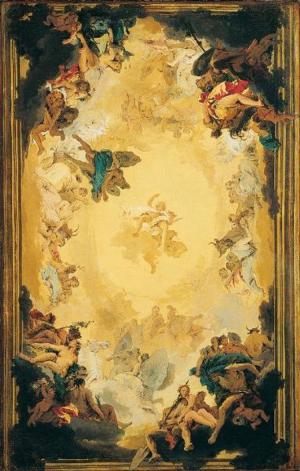| Author: | Francis Marion Crawford | ISBN: | 9781465611284 |
| Publisher: | Library of Alexandria | Publication: | March 8, 2015 |
| Imprint: | Language: | English |
| Author: | Francis Marion Crawford |
| ISBN: | 9781465611284 |
| Publisher: | Library of Alexandria |
| Publication: | March 8, 2015 |
| Imprint: | |
| Language: | English |
The story of his wrongs was a simple one. He had formerly been a very successful man. Of a good New England family, he had come to New York when very young, possessed of a small capital, full of integrity, industry, and determination. At the age of forty he was at the head of a banking firm which had for a time enjoyed a reputation of some importance. Then he had married a young lady of good birth and possessing a little fortune, to whom he had been attached for years and who had waited for him with touching fidelity. Twelve months later, she had died in giving birth to George. Possibly the terrible shock weakened Jonah Wood’s nerves and disturbed the balance of his faculties. At all events it was at this time that he began to enter into speculation. At first he was very successful, and his success threw him into closer intimacy with Thomas Craik, a cousin of his dead wife’s. For a time everything prospered with the bank, while Wood acquired the habit of following Craik’s advice. On an ill-fated day, however, the latter persuaded him to invest largely in a certain railway not yet begun, but which was completed in a marvellously short space of time. In the course of a year or two it was evident that the road, which Craik insisted on running upon the most ruinous principles, must soon become bankrupt. It had of course been built to compete with an old established line; the usual war of rates set in, the old road suffered severely, and the young one was ruined. This was precisely what Craik had anticipated. So soon as the bankruptcy was declared and the liquidation terminated, he bought up every bond and share upon which he could lay his hands. Wood was ruined, together with a number of other heavy investors. The road, however, having ceased to pay interest on its debts continued to run at rates disastrous to its more honest competitor, and before long the latter was obliged in self-defence to buy up its rival. When that extremity was reached Thomas Craik was in possession of enough bonds and stock to give him a controlling interest, and he sold the ruined railway at his own price, realising a large fortune by the transaction. Wood was not only financially broken; his reputation, too, had suffered in the catastrophe. At first, people looked askance at him, believing that he had got a share of the profits, and that he was only pretending poverty until the scandal should blow over, though he had in reality sacrificed almost everything he possessed in the honourable liquidation of the bank’s affairs, and found himself, at the age of fifty-seven, in possession only of the small fortune that had been his wife’s, and of the small house which had escaped the general ruin, and in which he now lived. Thomas Craik had robbed him, as he had robbed many others, and Jonah Wood knew it, though there was no possibility of ever recovering a penny of his losses. His nerve was gone, and by the time people had discovered that he was the most honest of men, he was more than half forgotten by those he had known best. He had neither the energy nor the courage to begin life again, and although he had cleared his reputation of all blame, he knew that he had made the great mistake, and that no one would ever again trust to his judgment. It seemed easiest to live in the little house, to get what could be got out of life for himself and his son on an income of scarcely two thousand dollars, and to shut himself out from his former acquaintance.
The story of his wrongs was a simple one. He had formerly been a very successful man. Of a good New England family, he had come to New York when very young, possessed of a small capital, full of integrity, industry, and determination. At the age of forty he was at the head of a banking firm which had for a time enjoyed a reputation of some importance. Then he had married a young lady of good birth and possessing a little fortune, to whom he had been attached for years and who had waited for him with touching fidelity. Twelve months later, she had died in giving birth to George. Possibly the terrible shock weakened Jonah Wood’s nerves and disturbed the balance of his faculties. At all events it was at this time that he began to enter into speculation. At first he was very successful, and his success threw him into closer intimacy with Thomas Craik, a cousin of his dead wife’s. For a time everything prospered with the bank, while Wood acquired the habit of following Craik’s advice. On an ill-fated day, however, the latter persuaded him to invest largely in a certain railway not yet begun, but which was completed in a marvellously short space of time. In the course of a year or two it was evident that the road, which Craik insisted on running upon the most ruinous principles, must soon become bankrupt. It had of course been built to compete with an old established line; the usual war of rates set in, the old road suffered severely, and the young one was ruined. This was precisely what Craik had anticipated. So soon as the bankruptcy was declared and the liquidation terminated, he bought up every bond and share upon which he could lay his hands. Wood was ruined, together with a number of other heavy investors. The road, however, having ceased to pay interest on its debts continued to run at rates disastrous to its more honest competitor, and before long the latter was obliged in self-defence to buy up its rival. When that extremity was reached Thomas Craik was in possession of enough bonds and stock to give him a controlling interest, and he sold the ruined railway at his own price, realising a large fortune by the transaction. Wood was not only financially broken; his reputation, too, had suffered in the catastrophe. At first, people looked askance at him, believing that he had got a share of the profits, and that he was only pretending poverty until the scandal should blow over, though he had in reality sacrificed almost everything he possessed in the honourable liquidation of the bank’s affairs, and found himself, at the age of fifty-seven, in possession only of the small fortune that had been his wife’s, and of the small house which had escaped the general ruin, and in which he now lived. Thomas Craik had robbed him, as he had robbed many others, and Jonah Wood knew it, though there was no possibility of ever recovering a penny of his losses. His nerve was gone, and by the time people had discovered that he was the most honest of men, he was more than half forgotten by those he had known best. He had neither the energy nor the courage to begin life again, and although he had cleared his reputation of all blame, he knew that he had made the great mistake, and that no one would ever again trust to his judgment. It seemed easiest to live in the little house, to get what could be got out of life for himself and his son on an income of scarcely two thousand dollars, and to shut himself out from his former acquaintance.















